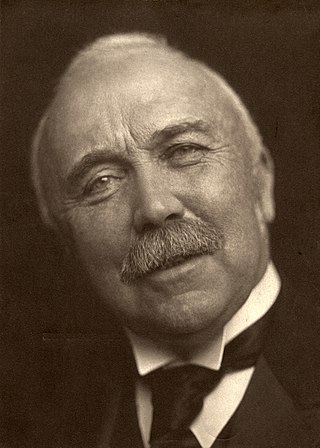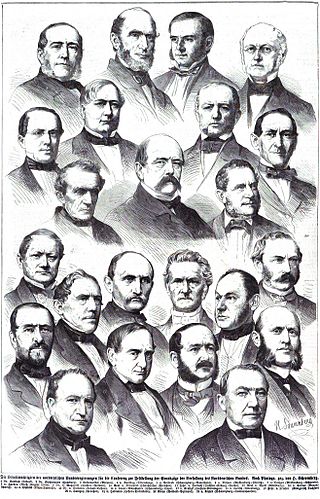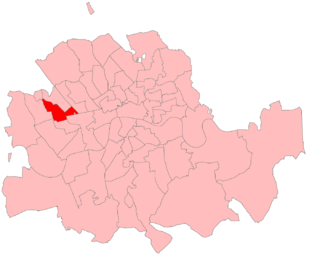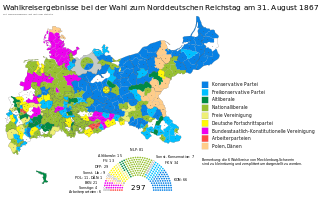
The Bundestag is the German federal parliament. It is the only federal representative body that is directly elected by the German people, comparable to the United States House of Representatives or the House of Commons of the United Kingdom. The Bundestag was established by Title III of the Basic Law for the Federal Republic of Germany in 1949 as one of the legislative bodies of Germany and thus it is the historical successor to the earlier Reichstag.

The German People's Party was a conservative-liberal political party during the Weimar Republic that was the successor to the National Liberal Party of the German Empire. Along with the left-liberal German Democratic Party (DDP), it represented political liberalism in Germany between 1918 and 1933.

The North German Confederation was initially a German military alliance established in August 1866 under the leadership of the Kingdom of Prussia, which was transformed in the subsequent year into a confederated state that existed from July 1867 to December 1870. A milestone of the German Unification, it was the earliest continual legal predecessor of the modern German nation-state known today as the Federal Republic of Germany.

The 1906 United Kingdom general election was held from 12 January to 8 February 1906.

The 1867 Quebec general election was held in August and September 1867 to elect members of the First Legislature for the Province of Quebec, Canada. The Quebec Conservative Party, led by Premier Pierre-Joseph-Olivier Chauveau, defeated the Quebec Liberal Party led by Henri-Gustave Joly de Lotbinière.

The National Liberal Party was a liberal party of the North German Confederation and the German Empire which flourished between 1867 and 1918.

The Prussian three-class franchise was an indirect electoral system used from 1848 until 1918 in the Kingdom of Prussia and for shorter periods in other German states. Voters were grouped by district into three classes, with the total tax payments in each class equal. Those who paid the most in taxes formed the first class, followed by the next highest in the second, with those who paid the least in the third. Voters in each class separately elected one third of the electors who in turn voted for the representatives. Voting was not secret. The franchise was a form of apportionment by economic class rather than geographic area or population.

The North German Constitution was the constitution of the North German Confederation, which existed as a country from 1 July 1867 to 31 December 1870. The Constitution of the German Empire (1871) was closely based on it.

Bath is a constituency in the House of Commons of the Parliament of the United Kingdom represented by Wera Hobhouse of the Liberal Democrats.

The 2005 United Kingdom general election was held on Thursday 5 May 2005, to elect 646 members to the House of Commons. The governing Labour Party, led by Tony Blair, won its third consecutive victory, with Blair becoming the second Labour leader after Harold Wilson to form three majority governments. However, its majority fell to 66 seats compared to the 167-seat majority it had won four years before. This was the first time the Labour Party had won a third consecutive election, and remains the party's most recent general election victory.

Federal elections were held in Germany on 12 January 1912. Although the Social Democratic Party (SPD) had received the most votes in every election since 1890, it had never won the most seats, and in the 1907 elections, it had won fewer than half the seats won by the Centre Party despite receiving over a million more votes. However, the 1912 elections saw the SPD retain its position as the most voted-for party and become the largest party in the Reichstag, winning 110 of the 397 seats.

The Scottish Conservative & Unionist Party, often known simply as the Scottish Conservatives and colloquially as the Scottish Tories, is a centre-right political party in Scotland. It is the second-largest party in the Scottish Parliament and the third-largest in Scottish local government. The party has the second-largest number of Scottish MPs in the House of Commons of the United Kingdom and the seventh overall.
Oxford University was a university constituency electing two members to the British House of Commons, from 1603 to 1950. The last two members to represent Oxford University when it was abolished were A. P. Herbert and Arthur Salter.

Paddington South was a Parliamentary constituency in London which returned one Member of Parliament. It was a compact urban area, but predominantly wealthy, and was most famously represented by Lord Randolph Churchill during the latter part of his career.

Paddington North was a borough constituency in the Metropolitan Borough of Paddington in London which returned one Member of Parliament (MP) to the House of Commons of the Parliament of the United Kingdom, elected by the first past the post voting system. It was created in 1885, and abolished for the February 1974 general election.
The Saxon People's Party was a left-liberal and radical democratic party with socialist leanings in Germany, founded by Wilhelm Liebknecht and August Bebel on 19 August 1866 in Chemnitz, and integrated into the newly-founded Social Democratic Workers' Party (SDAP) on 8 August 1869. It was an alliance between liberal, anti-Prussian bourgeois and socialist workers' organizations in Saxony. It is considered one of the precursors to the Social Democratic Party of Germany.

The 1927 Southwark North by-election was a parliamentary by-election for the British House of Commons constituency of Southwark North held on 28 March 1927.

The Reichstag of the German Empire was Germany's lower House of Parliament from 1871 to 1918. Within the governmental structure of the Reich, it represented the national and democratic element alongside the federalism of the Bundesrat and the monarchic and bureaucratic element of the executive, embodied in the Reich chancellor. Together with the Bundesrat, the Reichstag had legislative power and shared in decision-making on the Reich budget. It also had certain rights of control over the executive branch and could engage the public through its debates. The emperor had little political power, and over time the position of the Reichstag strengthened with respect to the Bundesrat.

The Reichstag of the North German Confederation was the federal state's lower house of parliament. The popularly elected Reichstag was responsible for federal legislation together with the Bundesrat, the upper house whose members were appointed by the governments of the individual states to represent their interests. Executive power lay with the Bundesrat and the king of Prussia acting as Bundespräsidium, or head of state. The Reichstag debated and approved or rejected taxes and expenditures and could propose laws in its own right. To become effective, all laws required the approval of both the Bundesrat and the Reichstag. Voting rights in Reichstag elections were advanced for the time, granting universal, equal, and secret suffrage to men above the age of 25.

Elections to the Reichstag of the North German Confederation were held on 31 August 1867, with run-off elections during the following weeks. The National Liberal Party continued to serve as the largest party, winning 81 seats. These were the first regular and last elections during the North German Confederation. In July 1870 the Reichstag members decided not to hold new elections during the Franco-Prussian war, in spite of the three-year period.






















